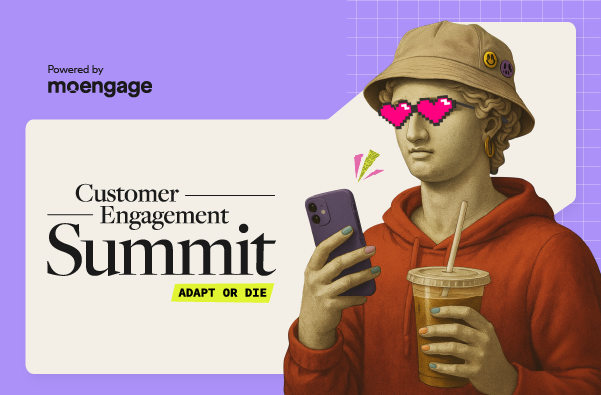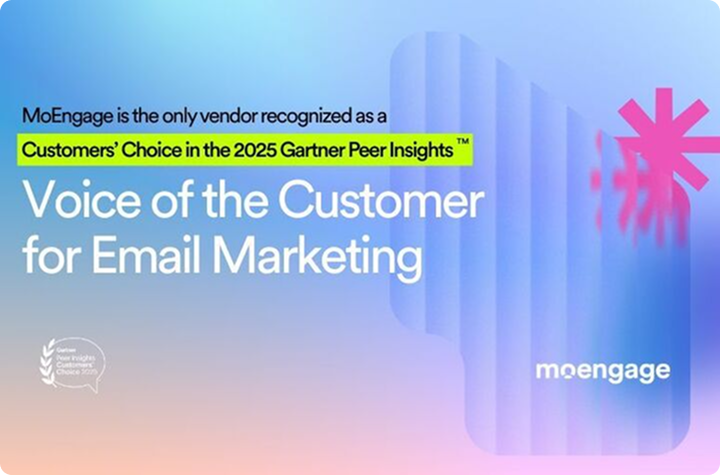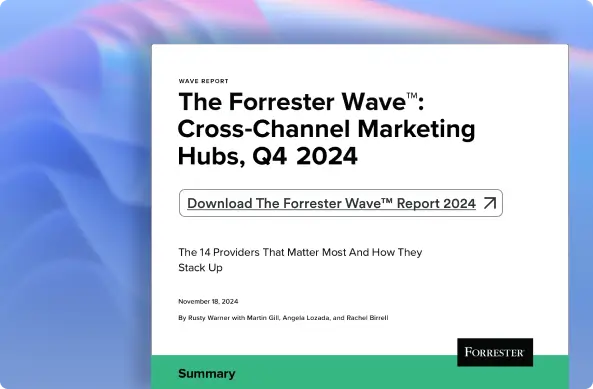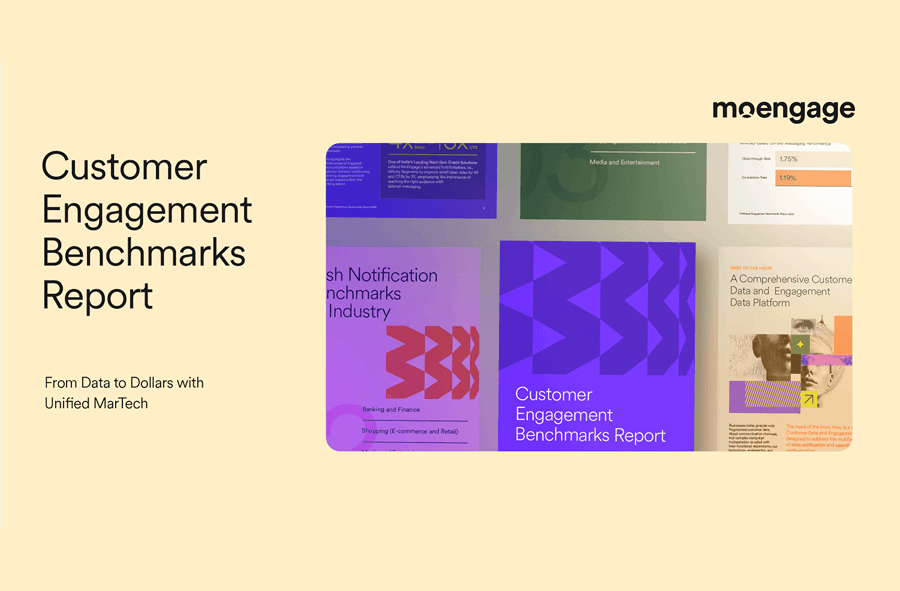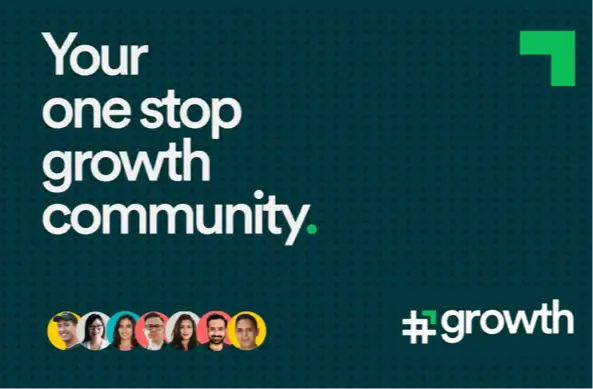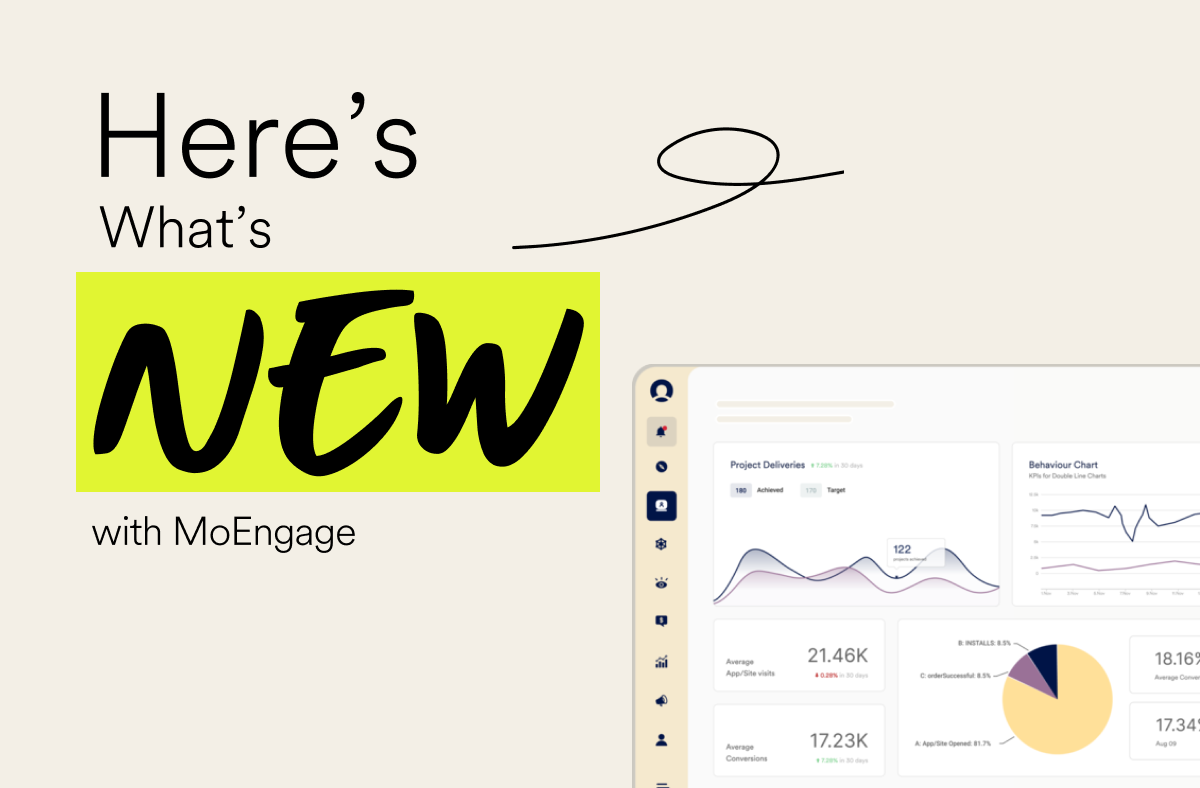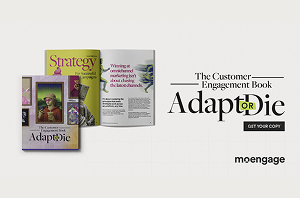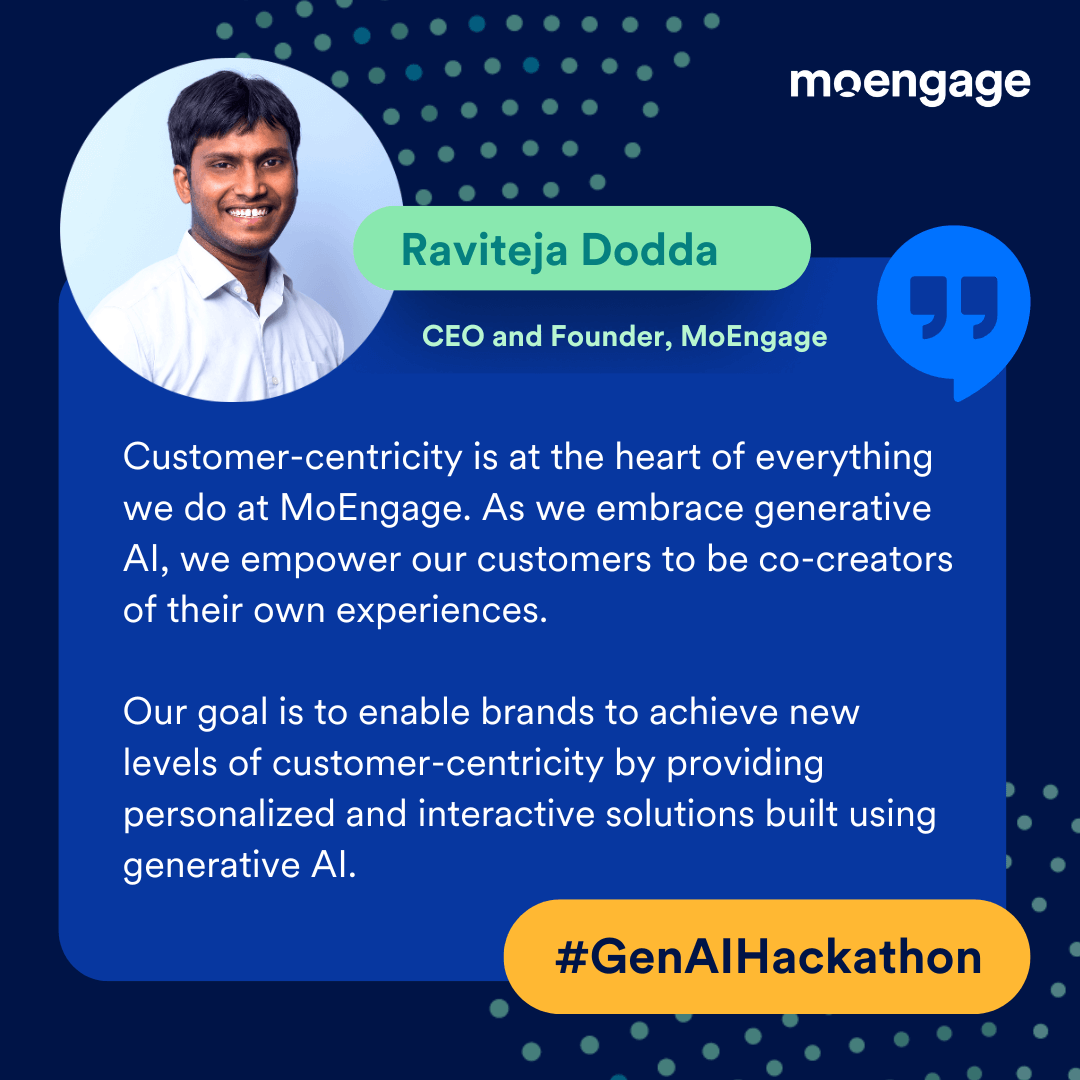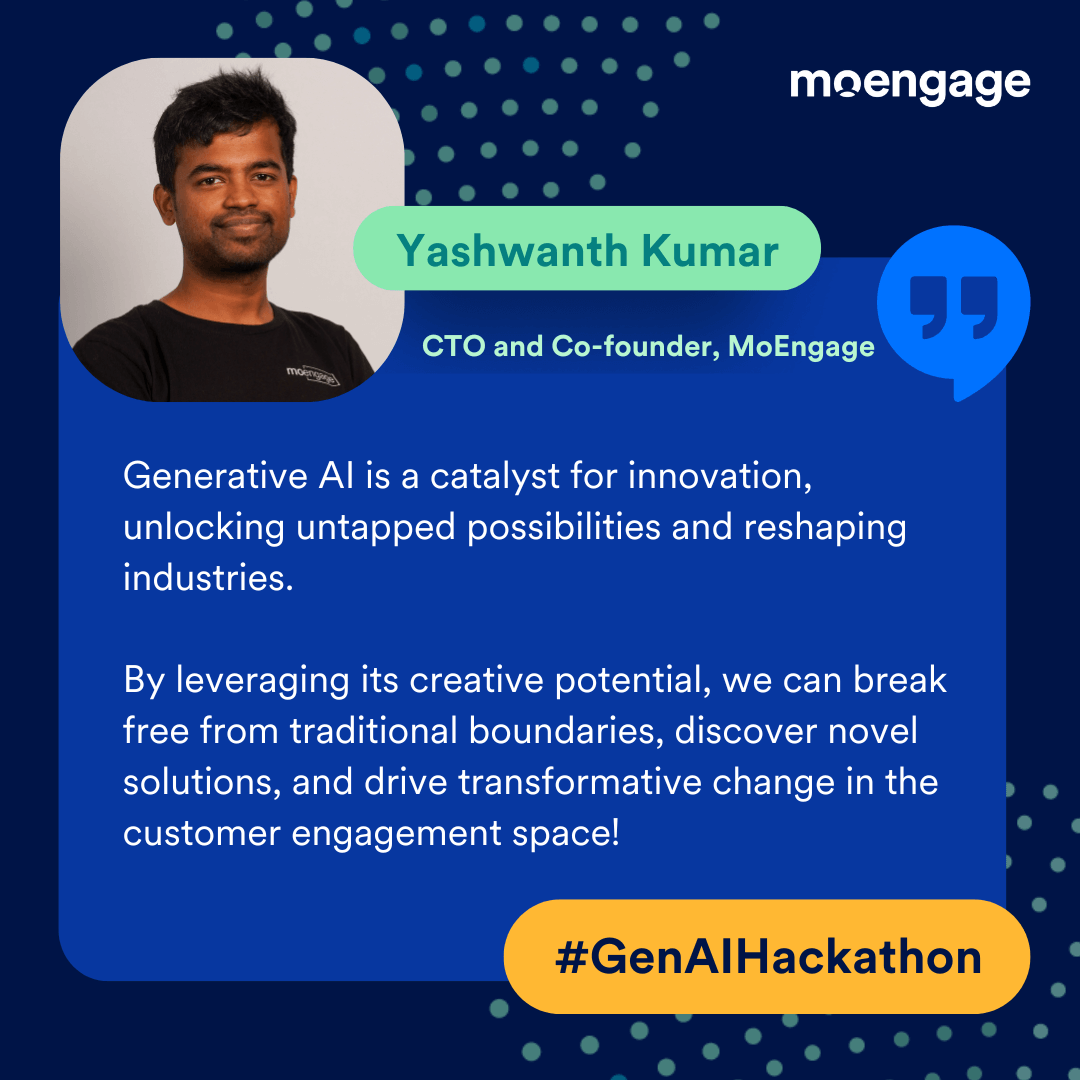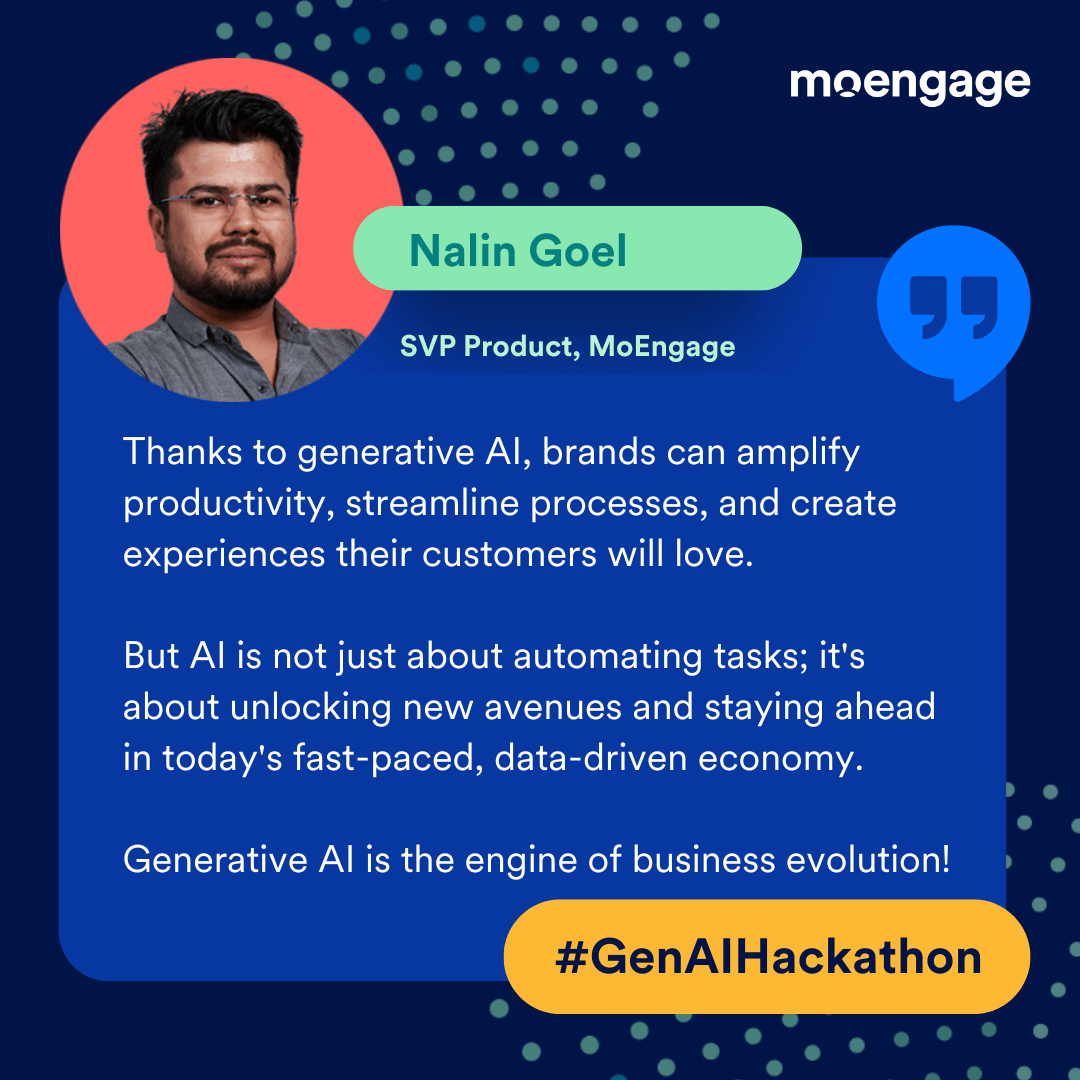MoEngage Hackathon 2023: Exploring Innovative Ways For Businesses to Leverage Generative AI
In June 2023, MoEngage organized a 24-hour Hackathon where MoEngage employees built 12 new MVPs that use generative AI.
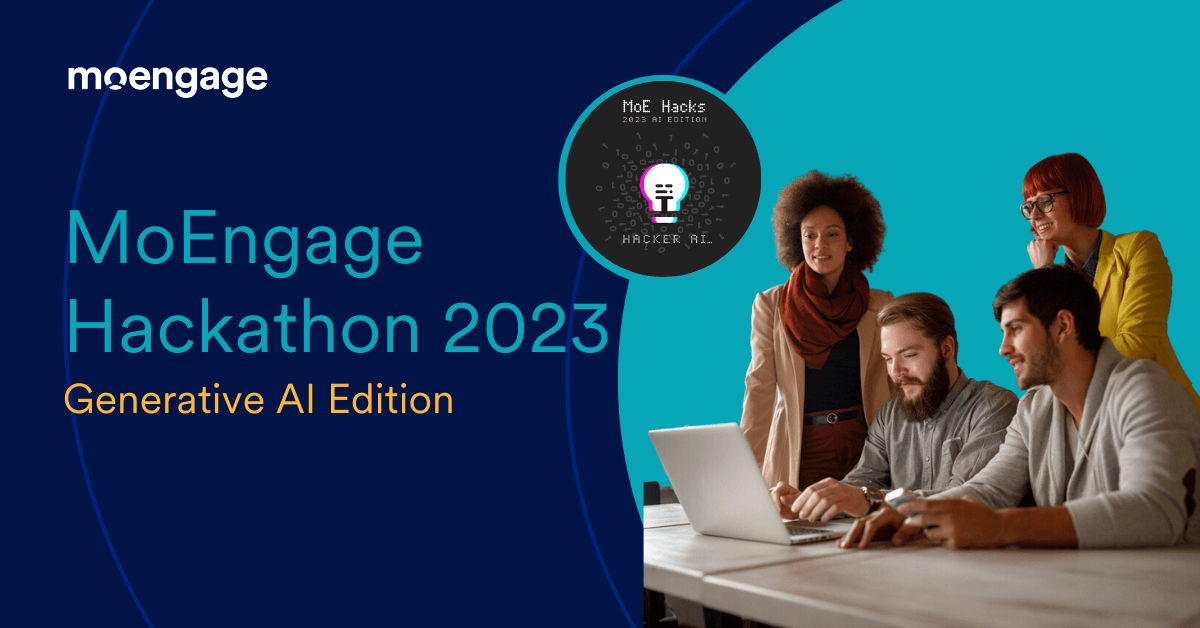
Reading Time: 7 minutes
A Wednesday evening in the month of June in Bangalore usually means an overcast sky and a downpour in the streets.
But at the MoEngage office, the race for the best generative AI MVP was getting heated by the minute!
The gloomy weather outside couldn’t dampen the vibes of over 100 MoEngage employees from Engineering, Product, Marketing, Customer Success, Sales, and Human Resources functions. Pizzas, beer, and cans of Red Bulls did play an important role, though!
About the MoEngage Generative AI Hackathon 2023
Customer-centricity and innovation hold a special place in MoEngage’s culture.
With the adoption of generative AI skyrocketing in the past year, hosting a Hackathon on this theme served as a great way for us to tap into and explore the true potential of generative AI together.
The Hackathon proved an excellent opportunity for participants from all functions at MoEngage to learn about generative AI, collaborate to solve Customer Engagement challenges, and have fun along the way!
Our Hackathon judges share their thoughts about generative AI
Generative AI has the potential to disrupt how brands approach customer engagement. Here’s what the leaders at MoEngage have to say about generative AI and its impact:
All participants developed MVPs and presented business cases for their generative AI projects – from recommending shopping products to virtual try-ons to creating customer segments on the fly!
As a MoEngage customer, you may see some of these MVPs on your dashboard soon 😉
You can get detailed information about all the ideas here.
The Winners That Stole the Show

With 12 MVPs and business presentations to go over, the Hackathon judges were tasked with a behemoth job – picking the top 3 generative AI projects that will redefine the customer engagement space.
After multiple long and hard discussions, the panel of judges finally selected their top 3 choices:
- SegmentChat – Suranshu Garg, Rishabh Acharya, Mohit Bansal, Neha, and Abhishek Tawania
- Jin-Z – Mohit Baranwal, Hemanth Thota, Ritu Gupta, Dharani, and Akshaya Sankpal
- GeneAI Personalize – Anusha Bhagam, Vishwa, Mrityunjay, and Ankit Anand
The panel also awarded ShopAssist by The Flash Transformers for the team’s innovative idea!
Join us at MoEngage!
Are you looking for a new challenge at an organization that offers you opportunities to participate in regular Hackathons and encourages you to explore outside your comfort zone? We’re hiring!
List of All the Generative AI MVPs Built at MoEngage Hackathon 2023
1. ShopAssist by The Flash Transformers
According to a survey, 41% of online shoppers face difficulty finding “the exact product” they are looking for.
Consumers today have to manually search and sift through excessive details to find specific product information, resulting in a time-consuming and cumbersome customer experience.
Aimed at bringing the perks of an offline shopping experience to online commerce, ShopAssist is a natural language bot that answers queries exclusively about a shopping brand’s products and recommends products based on the questions asked by their customers.

2. SupportGPT by MoeHackers
As brands expand into new markets or geographies and witness an increase in their customer base, the volume of support tickets grows proportionally. MoEngage internal data estimates that the volume of monthly support tickets grows by about 41% every year.
SupportGPT, a smart assistant, helps Customer Support teams
- Summarize support tickets to help in re-assigned tickets and quality audit,
- Auto-generate the first response to help reduce FRT significantly, and
- Answer questions based on existing support and help docs
3. ObserveGPT
The protection of sensitive information and the security of data is a top priority for all organizations.
While a lot of modern open-source generative AI platforms add tremendous value to marketers, there is a need to be cautious.
Most current generative AI platforms do not have accountability and complete control of their data collection and usage policies. There are also several scenarios where data flows to and is stored in uncontrolled and unknown locations.
Continued usage of insecure connections can also lead to potential data loss, increasing the chance of data breaches and exposure of potential vulnerabilities.
ObserveGPT is a proxy layer that will restrict the direct usage of generative AI platforms, forcing all requests to go through a proxy. The tool monitors tokens and applies rate limits to individuals who try to exploit the additional security layer. Any internal code pasted to the platform automatically gets restricted by ObserveGPT.

4 & 5. JinjaGPT and Jin-Z
To keep your customers happy and engaged, you need more than basic personalization based on attributes such as first name. Marketers must implement hyper-personalization, delivering tailored messages to individual customers for a remarkable customer experience.
Marketers rely on Jinja templates to achieve advanced personalization, allowing them to generate content dynamically.
JinjaGPT and Jin-Z automate Jinja creation and reduce turnaround time (TAT). This helps marketers launch their campaigns quickly and efficiently, reducing their go-live time by more than 8 hours every month!
6. GeneAI Personalize
When consumers try on clothes at a physical outlet, they can immediately tell if they’re the right choice. It is easier to swap out the wrong choices and browse for different colors, styles, or price points that they’re looking for.
Shopping for clothes should be this seamless in the virtual world as well. Snapchat, Google, YouTube, Meta (earlier known as Facebook), and Apple have launched successful virtual try-on campaigns for leading shopping brands.
GeneAI takes your customers images, maps their browsing and search behavior to your existing product catalog, and automatically generates images of customers wearing the clothing products they were looking for.
These images are then fed to existing campaigns on push notifications, website banners, social media ad networks, WhatsApp, emails, and other channels to bring your customers who have abandoned their carts back to your platform to complete their purchase.

7. SegmentChat
A MoEngage analysis showed that advanced segmentation helps improve customer engagement by deploying personalized campaigns.
- Personalizing emails based on customer behavior boosts open rates by 2.7x
- Push Notifications personalized based on customer behavior lead to 5.47x more clicks
- Consumers are 3.86x more likely to click on mobile in-app messages and website banners personalized based on customer journey
- When brands personalize Text Messages (SMS) based on customer journey, they witness 6x more conversions
SegmentChat is a product that allows marketers to create custom segments via chat input. The model processes available customer attributes, events, and event attributes to build a segment of customers based on a marketer’s queries.
SegmentChat offers iterative segmentation, allowing marketers to add more filters on generated segments to refine their customer cohorts further and send hyper-personalized communication.
8. CatalogTai
CatalogTai is an AI-powered data catalog that automatically creates descriptions of data assets within seconds. The catalog relies on metadata to generate descriptions for assets of the same type with similar names.
This helps marketers lower costs and increase efficiency thanks to higher automation and better resource utilization. Using CatalogTai also reduces error rates and improves ease of understanding.

9. Gyaana by Brain Buzz
As an organization grows, finding the answers to your queries from multiple knowledge bases gets challenging.
Gyaana is a Slack bot that fetches responses to queries from Slack conversations and Help or Support documents, uses an open-source generative AI model to compile a response, and shares the information you need – all with the added benefit of keeping your organization’s data private.
10. CostSaber by JediMasters
Cloud Cost Optimization is an important process for any organization. It is critical to ensure organizations are optimizing and making the most of their IaaS investments without compromising the quality of service.
There are several challenges with the existing traditional methods:
- Manual effort: Critical engineering man-hours are spent on data entry and Google Sheet updates.
- Not on-demand: Decision-making is delayed resulting in more $ racking up!
- Data Prep is a prerequisite for any analysis, resulting in further delays in decision-making.
- Not user-friendly: Most platforms can’t be used by non-tech-savvy functions like Finance or upper management.
- Manual intervention means that data and reports are error-prone and not scalable.
Cost Saber is a next-generation AI-powered Resource Management Assistant that helps move all the data and analysis from boring and cumbersome Excel sheets to on-demand, quick, and insightful Query Analysis.
Instead of being bogged down with manual data cleanup and filters, an organization’s employees can ask their queries to CostSaber and get insightful answers within milliseconds!

11. LocalizeGPT
Localize GPT is a product that empowers marketers to effortlessly analyze email HTML templates and generate a translated version in the marketer’s desired local language while preserving the original layout and design.
This helps marketers seamlessly reach out to and engage a global audience by delivering vernacular email content, exponentially improving their personalization efforts with minimum time investments!
12. CoreGPT
CoreGPT is a chatbot that can be used by Marketers and Product Owners to create customer journey campaigns within seconds by inputting factors such as use cases and communication channels to be used.
Some common use cases CoreGPT can help with brands include:
- Abandoned Cart (Shopping)
- Informing customers about upcoming sale announcements and recommending products based on their past purchases (Shopping)
- New customer onboarding (BFSI)
- Policy renewal reminders (BFSI)


